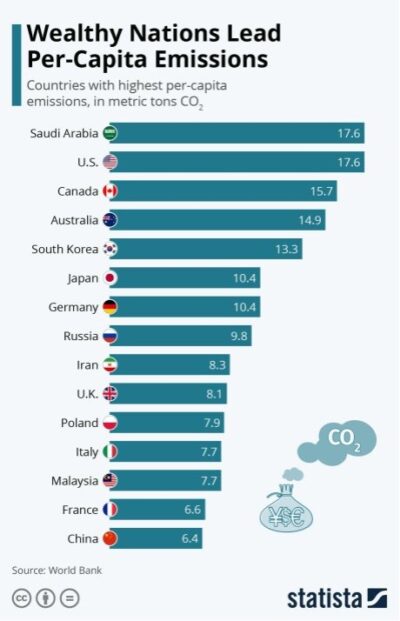With the recent G7 summit in Cornwall, where world leaders met to discuss carbon emissions and reverse climate change, lowering our carbon footprint has never been more under the microscope.
And while we’re all doing our bit to reduce emissions, it is important to take stock and assess how close the UK is to carbon neutrality.

Image credit: Statista.com
On a global scale, the UK’s emissions are reducing much faster than others, with the UK’s total carbon emissions falling by 44% in the period 1990-2019. However, a 2021 survey of the world’s wealthiest countries by the World Bank and Statista found that the UK is still the 10th highest polluter per capita, emitting 8.1 metric tons of CO2, compared to the largest polluters, the USA and Saudi Arabia, who are tied in first with a staggering 17.6 metric tons. The UK still produced 414.1MtCO2e (million tonnes of CO2 equivalent) in 2020.
But although the UK and EU countries have started to move towards renewable energy, many still have some of the highest carbon emission rates in the world, reflecting their industrial pasts. On a more individual level, the U.S, Saudi Arabia and Canada are the top-polluting countries per household.
While figures are decreasing in many countries, it is certainly the case that these emissions levels are not decreasing quickly enough. If we are to achieve net-zero in time to avoid the worst effects of climate change, this needs to be addressed now.
Not next year.
Not in 2025.
NOW.
And to do that, there needs to be a substantial investment and shift to renewable energy, like solar, wind and hydrogen. Huge investments in solar have seen its global energy contribution rise to 3%, with a similar uptake in wind seeing it contribute 7%. With the US, China and the EU investing heavily in hydrogen and other green technologies, there is hope that these technologies will provide a major boost to global renewable capacity.
But it will only make a difference if it’s implemented quickly.
Waiting another 5 years will be catastrophic for the whole planet.
While the UK has done a great job achieving the first 50% of its carbon reduction targets, the next 50% will be much harder. But one area in which the UK can improve dramatically is energy emissions from buildings.
A staggering 42% of energy emissions in the UK come from buildings, and almost half of this comes from the energy used within the home (i.e. cookers, kettles, etc.).
The first steps to reduce this wastage are to:
Gas boilers make up 78% of the total energy used to heat buildings in the UK. And although almost all of us rely on gas heating, it has to be replaced by green, renewable energy as fast as possible.
And as for building emissions?
Well, the fact is 80% of the buildings which will be around in the net-zero target year of 2050 have already been built, which means those which are bleeding emissions need to be retrofitted, improved and adapted to meet new energy targets.
And while future buildings need to be energy efficient, the whole chain, including products, transport and construction, needs to hit sustainability targets.
Meanwhile, 119 metric tons of CO2 is created by transport, meaning public transport needs to be decarbonized, and the infrastructure for electric and hydrogen vehicles invested in and improved too.
Do all these and the UK will be well on its way to reaching carbon neutrality.
But it’s not just up to us. It’s up to the rest of the world to do their bit too.
At Inteb, we help building owners, managers and investors assess their buildings to NABERS UK standard by:
So, what are you waiting for?
Let’s get the conversation started – call us now on 0151 601 3476